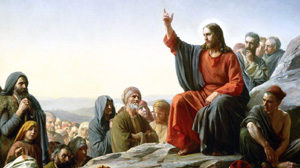Isaiah 43:16-21
Philippians 3:8-14
John 8:1-11
Reflection:
To get a better context for today’s Gospel it is helpful to read the previous chapter to see the plot as it is builds against Jesus. The day before Jesus was teaching in the temple area and some in the crowds were suggesting that he might be a Prophet or even the Messiah. It said there was a division among the crowd because of him and some had wanted to arrest him. Jesus is creating a disturbance in the status quo and it appears that the leadership wanted to get rid of this problem. Our text for today begins “early the next morning” and Jesus is found sitting down teaching again. This plot to test Jesus is so transparent; in reality the woman is also a victim—where is the man? In Leviticus 20:10 the law states that both the man and the woman shall be put to death. Jesus begins to write in the sand while the scribes and the Pharisees seem to be blind to his actions; having set him up they are waiting and focused on his answer. It seems they expect him to speak.
Jesus’ response is to invite the one without sin to cast the first stone as he continues writing in the sand. Beginning with the elders they start to leave. Many bible commentaries will suggest this story is more about non-condemnation than forgiveness; Jesus made the Pharisees aware of their own darkness so they left. Something different is happening here.
The first reading from Isaiah touches on the fact that God is doing something new; he snuffed out the enemy in pursuit of the Israelites—like a wick. Isaiah impresses upon them to remember not the past and offers that God will send rivers flowing through the wastelands. We the readers today are invited to hear the echo of this text as we listen to the Gospel. Jesus did not come to condemn the woman but to save her. He did not come to abolish the law but to fulfill the law. Yet, the leaders fail to see the newness and the difference-perhaps feeling threatened by his message.
Jesus offers compassion and mercy to the woman and invites her to go and sin no more and this is important. Sin is the absence of God and the woman—and you and I—are invited to stay close to God. Like the scribes and the Pharisees, we can become derailed by our pursuits and make decisions that are not always in keeping with our values. It can be so easy to rationalize our actions. Jesus quenched out sin—like a wick—and now it is up to us to do likewise. This is St. Paul’s point in our second reading—focusing on Christ and being possessed by him leaving everything else behind.
In reflecting on this Gospel, I loved the visual of Jesus sitting down as he taught the people. He still does that today whenever two or three are gathered—he sits among us. Come Lord, Jesus, heal us.
Jean Bowler is a retreatant at Mater Dolorosa Passionist Retreat Center in Sierra Madre, and a member of the Office of Mission Effectiveness Board of Holy Cross Province.

